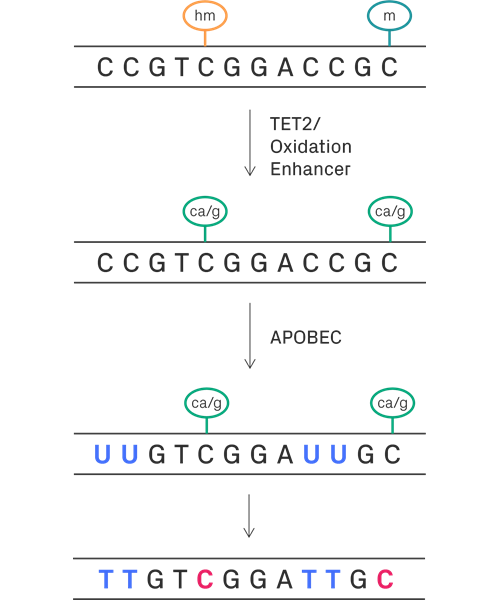Methylation Sequencing
Methylation sequencing is a technique used to quantify DNA methylation – an epigenetic modification that alters gene expression – by converting nucleotide bases using sodium bisulfite. In eukaryotes, cytosine often methylates to form 5-methylcytosine (5mC), particularly when accompanied by guanine (CpG). These modifications occur in animals and plants and can ultimately impact embryonic development, tissue regeneration, and pathogenesis.
We use wet and dry lab solutions for methylation sequencing, including Methyl-Seq, to help you explore the methylome through whole genome or targeted 5-methylcytosine (5mC) detection.
What is methylation sequencing?
Methylation sequencing is the process in which DNA methylation is quantified using sodium bisulfite and subsequent nucleotide base conversion. Methylation sequencing is used to detect the DNA methylation status of both the starting DNA strand and the DNA methylation patterns of the resulting double-stranded DNA (post-amplification). In analyzing the results of methylation sequencing, a comprehensive overview of DNA methylation patterns across the genome is uncovered, aiding scientists in understanding the epigenetic mechanisms that regulate cellular development, disease, and responses to environmental factors.
How does methylation sequencing work?
Methylation sequencing works by first converting unmethylated cytosines into uracil using sodium bisulfite. Uracil is read as thymine post-PCR amplification and sequencing. Direct PCR sequencing or cloning sequencing is then used to measure the read counts of thymine (the converted bases).
Since methylated cytosine is not converted by sodium bisulfite, methylation sequencing distinguishes methylated cytosine residues from unmethylated cytosine/converted thymine. DNA methylation status can then be determined and quantified from the total read counts of the converted thymine from direct PCR sequencing or cloning sequencing. Methylation sequencing allows you to map and quantify the presence of methyl groups on DNA strands—a critical component of gene regulation and expression.
ENZYMATIC CONVERSION & SEQUENCING
1. Protection/Enzymatic Conversion
Submit cells, tissue, or gDNA for enzymatic conversion of unprotected cytosine
2. Library Preparation
Add adapters to ssDNA fragments
3. Sequencing
Sequence 2×150 bp on Illumina® platform
4. Data Analysis
Identify 5mC sites, calculate methylation ratios, and perform differential methylation analysis
Methylation Sequencing Features & Benefits
METHYLATION Sequencing Overview
After protecting modified cytosines from downstream deamination, an enzymatic step deaminates cytosine but does not affect 5caC and 5ghmC. The resulting converted sequence can be used to compare treated and untreated samples, creating a snapshot of 5mC methylation patterns across the whole genome or targeted regions of interest.

NGS PLATFORMS
For information on our NGS platforms as well as recommended configurations of your projects, please visit the NGS Platforms page. GENEWIZ from Azenta does not guarantee data output or quality for sequencing-only projects.










